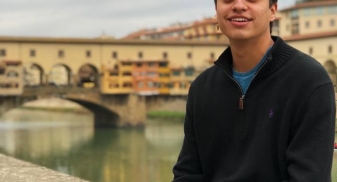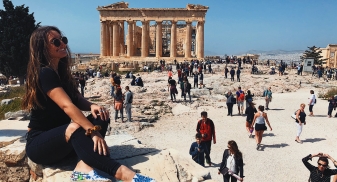John Cabot University (Italy)
The Program
Study at a prestigious, American-style liberal arts university in the heart of Rome - one of the world's most historic cities
John Cabot University (JCU), an American-style liberal arts university, welcomes approximately 600 study abroad students a year as well and as some 350 full degree-seeking Italian and international students. JCU offers courses in a variety of departments taught in English and Italian, with majors including Economics and Finance, International Business, Art History, Political Science, Communications, and Business Administration. The JCU campus is located in the Trastevere neighborhood, right in the heart of Rome. Students will take classes at Guarini and Tiber Campuses/Buildings, each less than a 10 minute walk from the other, with the Tiber Campus located right on the famous River!
Program Locations
Italy
Rome
Testaments to Rome’s preeminence are found all over the city, in the shape of the Colosseum, the Pantheon, St Peter’s Basilica, the Villa Borghese, the Spanish Steps, the Trevi Fountain, and a series of baroque piazzas. But despite the architectural backdrop, Rome is no ancient monument; it’s a fun, fast-moving city. In summer, the city’s calendar is packed with musical, theatrical, and literary events. And Rome is a center of world cinema, too—you can visit the Cinecittà studios—with an international film festival in October. When it comes to nightlife, the city has more than its fair share of bars and clubs, only don’t expect things to get started early—the locals will likely still be enjoying a late night dinner. Rome’s mild climate means you can be out on the streets and in the piazzas, strolling, enjoying the vibe, seeing and being seen, nearly all year round. Living in Trastevere, students are able to easily walk, tram, or taxi to any of the monuments, spaces, buildings and piazzas! At John Cabot, Rome truly is your campus.
Academics
In order to have an idea of what classes are available, you should visit the John Cabot University website.
Internship Opportunities
John Cabot University offers students the opportunity to participate in for-credit internships. JCU has many long standing and mutually beneficial agreements with international profit and non-profit organizations. You will work a total of 120-150 contact hours during the 14 week semester. Students will earn up to 3 credits. For more information please visit the John Cabot University Internship web page. Please note that internships cannot be guaranteed before a student goes abroad.
You will need to be sure that you are registered as a full time student according to both JCU and Rutgers University. That means you will need to take at least 12 credits each semester. The credit translation system between JCU and Rutgers University is 1:1, meaning a 3-credit course at JCU will also be a 3-credit course on your Rutgers University transcript. It is not possible to take classes not-for-credit or pass/fail.
For information about Study Abroad credit transfer, registration, and transcripts please visit the Academics section of our website.
Housing and Meals
Students may choose between the Trastevere & Neighborhood Apartments (both are *standard housing options):
Trastevere Apartments (*standard housing) - can house around 150 JCU students in addition to having the benefit of integrating students into a building with local Italian neighbors. These buildings are located steps from the tram line, and they are a 20-25 minute walk from both the Guarini and Frohring Campuses. The Trastevere Apartment buildings also have a 24/7 security guard on duty, a regular cleaning service, internet connection, and heating.
Neighborhood Apartments (*standard housing) - are traditional Roman-style apartments available in the Fall and Spring semesters. These apartments offer the most authentic living experience in the heart of Trastevere where next-door neighbors are Italian families.
*For students interested in the Gianicolo Residence & Lungara Apartments, please note this is an additional cost (due to JCU-directly).
The meal plan is available to all JCU students and can be used only at the Tiber Cafe. Students are issued meal plan points on their JCU ID card. The points can be used to purchase any item at the Tiber Cafe. Buying a meal plan is convenient, secure, and provides a 10% discount on all items.
Financial Information
Program Costs
| NJ Residents | Non-NJ Resident | |
|---|---|---|
| Program cost | $22,000 | $26,200 |
Program Cost includes:
• Tuition
• **Housing in standard (double) accommodations
• Administrative Fees
• Emergency Medical Access Abroad
** Should you request housing outside of the standard placements, you will be responsible for the pricing difference. This includes, but is not limited to, placement in Gianicolo, Lungara, or in single rooms. Note, if you have submitted your application for housing, and you then withdraw from the program you will be responsible for a $1000 non-refundable housing deposit to JCU. Additionally, after the housing unit has been occupied, no refund is possible.
Out-of-Pocket Costs
| Meals | $3,500 |
| Airfare | $1,100 |
| Local Transportation | $250 |
| Visa (Estimate is for US Citizens) | $200 |
| Books and Classroom Materials | $500 |
| Personal Expenses | $1,750 |
| Total | $7,300.00 |
Out-of-Pocket Cost includes:
The above costs are estimations and represent the known out-of-pocket costs students encounter during their time abroad.
Some of these expenses will be paid for prior to going abroad, such as an airline ticket and visa costs, while some of these expenses, such as meals and local transportation, will be paid in-country as part of your daily expenses. As you plan, you will need to budget these costs and spend wisely throughout your time abroad.
Program Costs
| NJ Residents | Non-NJ Resident | |
|---|---|---|
| Program cost | $22,000 | $26,200 |
Program Cost includes:
• Tuition
• **Housing in standard (double) accommodations
• Administrative Fees
• Emergency Medical Access Abroad
** Should you request housing outside of the standard placements, you will be responsible for the pricing difference. This includes, but is not limited to, placement in Gianicolo, Lungara, or in single rooms. Note, if you have submitted your application for housing, and you then withdraw from the program you will be responsible for a $1000 non-refundable housing deposit to JCU. Additionally, after the housing unit has been occupied, no refund is possible.
Out-of-Pocket Costs
| Meals | $3,500 |
| Airfare | $1,100 |
| Local Transportation | $250 |
| Visa (Estimate is for US Citizens) | $200 |
| Books and Classroom Materials | $500 |
| Personal Expenses | $1,750 |
| Total | $7,300.00 |
Out-of-Pocket Cost includes:
The above costs are estimations and represent the known out-of-pocket costs students encounter during their time abroad.
Some of these expenses will be paid for prior to going abroad, such as an airline ticket and visa costs, while some of these expenses, such as meals and local transportation, will be paid in-country as part of your daily expenses. As you plan, you will need to budget these costs and spend wisely throughout your time abroad.



